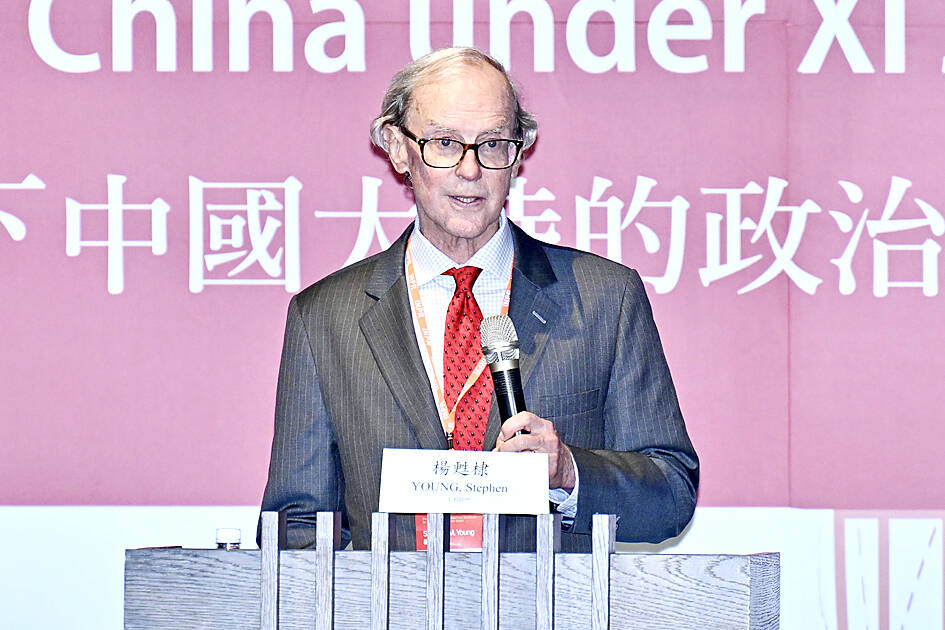The US Congress would continue to act “tough” on China regardless of whether US Vice President Kamala Harris or former US president Donald Trump wins the US presidential election on Nov. 5, a former top US diplomat to Taiwan said yesterday.
“No matter who wins the presidential elections this fall, the Congress will insist on broad continuity in our Asian policy, that will include continuing arms sales to Taiwan and projecting a tough stance toward any efforts by Beijing to threaten or attack this island,” former American Institute in Taiwan (AIT) director Stephen M. Young said at a forum in Taipei.
“If Kamala Harris is elected, she will demonstrate strong continuity with the [US President Joe] Biden team,” said Young, who was AIT director from 2006 to 2009.

Photo: Tu Chien-jung, Taipei Times
As vice president, Harris has so far “pushed back vigorously against Chinese territorial claims, reinforcing American alliances with our many allies and friends in the Asia-Pacific region,” he said.
“She is working assiduously to deepen her knowledge of the defense needed to maintain our alliances, showing an ability to rapidly familiarize herself with the Biden policies and any necessary additions aimed at crafting a bipartisan approach to defending Taiwan’s territorial integrity,” he said.
While Trump would be “less predictable” than Harris if re-elected, the Republican former president “would still face significant opposition to any substantive shift away from Taipei,” he said.
“The American Congress, across party lines, has long supported moral and material support for Taipei and its democratic system, and this is unlikely to change in the foreseeable future,” he added.
Meanwhile, China’s economy is “stalling at a time when many of its regional neighbors are thriving,” which is expected to limit Beijing’s influence “domestically as well as regionally,” Young said.
“The West has also increasingly pushed back against China on the economic front with tariffs and other trade restrictions,” he said. “This process is likely to continue with negative impacts on China’s domestic and international policies.”
Young urged Taiwan to “continue to bolster its defenses, especially in the Taiwan Strait and contiguous waters.”
The US, Japanese, Philippine and South Korean governments can also play a “productive role in this process,” he said, although he added that “it’s going to take time to rectify past differences” among US allies in creating responses to “Chinese aggression.”
Young made the remarks during his keynote address at a Taipei forum titled “The Political, Economic and Social Development Trends in Mainland China under Xi Jinping’s (習近平) Leadership.”
The one-day event was organized by the Mainland Affairs Council and the Institute for National Policy Research, a Taipei-based think tank.
Andrew Scobell, a distinguished fellow with the China program at the government-funded US Institute of Peace, also spoke at the forum, saying that China under Xi’s leadership is different than under previous leaders.
The Chinese Communist Party (CCP) under Xi has “doubled down” on bolstering its internal security mechanisms and apparatus, and elevated its attention to domestic matters, Scobell said.
As the most “ambitious top leader” since Mao Zedong (毛澤東), Xi’s elevated aspirations for “national rejuvenation” also include unprecedented foreign policy ambitions regionally and globally, he said.
The CCP’s goal of transforming China into a “global power of major consequence” seems to be intensifying, he said, adding that this ambition could make Xi’s China more “outwardly adventurous” in the years to come.

Taiwan has received more than US$70 million in royalties as of the end of last year from developing the F-16V jet as countries worldwide purchase or upgrade to this popular model, government and military officials said on Saturday. Taiwan funded the development of the F-16V jet and ended up the sole investor as other countries withdrew from the program. Now the F-16V is increasingly popular and countries must pay Taiwan a percentage in royalties when they purchase new F-16V aircraft or upgrade older F-16 models. The next five years are expected to be the peak for these royalties, with Taiwan potentially earning

STAY IN YOUR LANE: As the US and Israel attack Iran, the ministry has warned China not to overstep by including Taiwanese citizens in its evacuation orders The Ministry of Foreign Affairs (MOFA) yesterday rebuked a statement by China’s embassy in Israel that it would evacuate Taiwanese holders of Chinese travel documents from Israel amid the latter’s escalating conflict with Iran. Tensions have risen across the Middle East in the wake of US and Israeli airstrikes on Iran beginning Saturday. China subsequently issued an evacuation notice for its citizens. In a news release, the Chinese embassy in Israel said holders of “Taiwan compatriot permits (台胞證)” issued to Taiwanese nationals by Chinese authorities for travel to China — could register for evacuation to Egypt. In Taipei, the ministry yesterday said Taiwan

Taiwan is awaiting official notification from the US regarding the status of the Agreement on Reciprocal Trade (ART) after the US Supreme Court ruled US President Donald Trump's global tariffs unconstitutional. Speaking to reporters before a legislative hearing today, Premier Cho Jung-tai (卓榮泰) said that Taiwan's negotiation team remains focused on ensuring that the bilateral trade deal remains intact despite the legal challenge to Trump's tariff policy. "The US has pledged to notify its trade partners once the subsequent administrative and legal processes are finalized, and that certainly includes Taiwan," Cho said when asked about opposition parties’ doubts that the ART was

If China chose to invade Taiwan tomorrow, it would only have to sever three undersea fiber-optic cable clusters to cause a data blackout, Jason Hsu (許毓仁), a senior fellow at the Hudson Institute and former Chinese Nationalist Party (KMT) legislator, told a US security panel yesterday. In a Taiwan contingency, cable disruption would be one of the earliest preinvasion actions and the signal that escalation had begun, he said, adding that Taiwan’s current cable repair capabilities are insufficient. The US-China Economic and Security Review Commission (USCC) yesterday held a hearing on US-China Competition Under the Sea, with Hsu speaking on